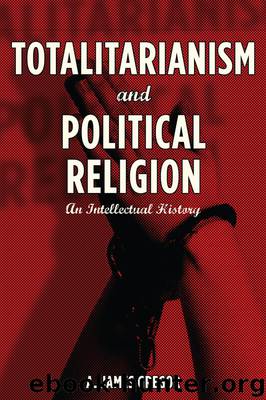Totalitarianism and Political Religion by Gregor A

Author:Gregor, A.
Language: eng
Format: epub
Publisher: Stanford University Press
Political Religion in the Thought of Giovanni Gentile
In a very substantial sense, Gentile conceived his idealism as providing the cognitive base of Mazzinian thought. Like Mazzini, Gentile saw religious sentiment at the very foundation of politics. The difference between them was that Gentile understood religious sentiment, religion itself, as but a “moment,” an expression, one form, of the “Absolute Spirit,” the ultimate reality of existence as consciousness28 —metaphysical notions entirely absent from the thought of Mazzini. In the more inclusive context of Gentile’s idealism, one might speak of religion only as a constituent of a larger “Absolute”—possessed of the essential properties of consciousness—an epistemological and ontological formulation entirely absent from Mazzinian thought.
Gentile was fully prepared to acknowledge the reality of religion, but conceived its rationale as inescapably predicated on a more comprehensive understanding of “Being” as reality. Religion was but one aspect of the effort undertaken by human consciousness to understand its own reality. None of that was to be found in the writings of Mazzini.
Gentile’s radical idealism rested on the immediate conviction that the first and unimpeachable truth we entertain as thinking human beings arises out of the reality—and our immediate awareness of that reality—of thinking itself.29 For Gentile’s “actual idealism,” there is at least one truth forever insulated from doubt: that there is thinking. We find ourselves at the center of that thinking—and out of current thinking we fabricate the subjective and objective reality of a universe of “internal” feeling and “external” things.30 In the complex, if practical, sorting out of such components, we “dialectically” identify “subjective” feeling—emotive expression and sentiment—with art. The “objective” we associate with “things” beyond ourselves31 —with the ordered, lawlike persistence of form and content—and with God, that “unknowable,” “immutable” finality beyond all “external” things.32
In the dialectical process out of which all such distinctions arise, human beings establish binding criteria for truth ascription in the several categories of reality—subjective or objective as the case might be. Gentile characterized all that analytic activity as necessarily “abstract” in a meaningful sense—each category necessarily less than the “concrete” totality. Within the concrete reality of things, artistic, scientific, and religious truths are severally governed by different admissibility criteria—governed largely, if not exclusively, by pragmatic considerations. Philosophy instructs us that in the last analysis, all such distinctions made in thought must ultimately resolve themselves, once again, in the “concrete” unity of immediate thinking.33
Gentile’s entire philosophical system was predicated on a rejection of what he called the classic notion of “reality” as an imagined arena in which congeries of “subjects” find themselves opposed by a preexisting “reality”—to which they must adapt. As has been suggested, he argued that modern philosophy had made the case for the identification of being and thought, of truth and humanity. Like the neohegelians of the mid nineteenth century, he saw those developments as nothing less than “the establishment of a regnum hominis . . . the instauration of a true humanism.”34 None of this is found in Mazzinism.
For actual idealism, human beings were not simply
Download
This site does not store any files on its server. We only index and link to content provided by other sites. Please contact the content providers to delete copyright contents if any and email us, we'll remove relevant links or contents immediately.
| Africa | Americas |
| Arctic & Antarctica | Asia |
| Australia & Oceania | Europe |
| Middle East | Russia |
| United States | World |
| Ancient Civilizations | Military |
| Historical Study & Educational Resources |
Cecilia; Or, Memoirs of an Heiress — Volume 1 by Fanny Burney(32536)
Cecilia; Or, Memoirs of an Heiress — Volume 2 by Fanny Burney(31933)
Cecilia; Or, Memoirs of an Heiress — Volume 3 by Fanny Burney(31925)
The Secret History by Donna Tartt(19017)
Sapiens: A Brief History of Humankind by Yuval Noah Harari(14356)
Leonardo da Vinci by Walter Isaacson(13303)
The Radium Girls by Kate Moore(12011)
Sapiens by Yuval Noah Harari(5358)
How Democracies Die by Steven Levitsky & Daniel Ziblatt(5207)
The Wind in My Hair by Masih Alinejad(5084)
Homo Deus: A Brief History of Tomorrow by Yuval Noah Harari(4894)
Endurance: Shackleton's Incredible Voyage by Alfred Lansing(4749)
Man's Search for Meaning by Viktor Frankl(4565)
The Silk Roads by Peter Frankopan(4520)
Millionaire: The Philanderer, Gambler, and Duelist Who Invented Modern Finance by Janet Gleeson(4456)
The Rape of Nanking by Iris Chang(4193)
Joan of Arc by Mary Gordon(4090)
The Motorcycle Diaries by Ernesto Che Guevara(4080)
Stalin by Stephen Kotkin(3949)
